Mixed train
A mixed train is a train that contains both passenger and freight cars or wagons.[1] Although common in the early days of railways, by the 20th century they were largely confined to branch lines with little traffic. Typically, service was slower, because mixed trains usually involved the shunting (switching) of rolling stock at stops along the way. However, some earlier passenger expresses, which also hauled time-sensitive freight in covered goods wagons (boxcars), would now be termed mixed trains. Generally, toward the end of the mixed train era, shunting at intermediate stops had significantly diminished. Most railway passenger and freight services are now administered separately.
.jpg.webp)
.jpg.webp)
Exclusions
Not intended by this article is the definition of mixed train to describe:
• mixed freight.[2][3]
• wagonload service (single wagons for various customers, assembled into trains), as opposed to trainload service (point to point, complete train for one customer).[4]
• a passenger train that runs sections as an express, but makes frequent stops elsewhere.[5]
• a train consisting of carriages of different classes (historical use).[6]
.JPG.webp)
Passenger trains that can carry travellers' cars on freight wagons at the rear of the train are excluded. Called motorail, such services operate in Austria, Turkey, Czech Republic, Slovakia, Finland, Serbia, Australia, Canada, Chile, and the US.
Car shuttle trains, on which passengers travel within their vehicles, are also omitted.
Africa and Asia
In parts of Asia and Africa, mixed trains still operate along corridors with reduced traffic. Routes include Asmara–Ghinda,[7] Bulawayo–Harare,[8] Elazığ–Tatvan,[9] Fianarantsoa–Manakara,[10] Kandy–Badulla,[11] Livingstone–Mulobezi, Phnom Penh–Poipet,[12] and Zahedan Mixed Passenger.
Australia
In Australia, mixed trains could also be called a "car goods", "goods train with car attached", or "mixed goods". However in some countries, the latter term refers instead to a freight train carrying multiple types of freight rather a single commodity. In most states, a mixed train was technically a goods train with passenger accommodation, meaning it had lower priority over other trains and could be cancelled without notice if there were no goods to carry.
The Victorian Railways had a class of train called a "limited through mixed" which limited the amount of goods and ran to a set timetable and would be guaranteed to run even without waiting goods.
Forming a further type of mixed train, railmotors or railcars might haul a one or two goods wagons or a goods brake van carrying some freight.
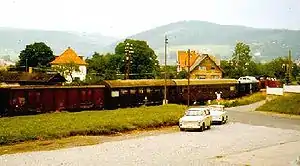
Austria, Germany and Switzerland
In German-speaking countries, two main types of mixed train (Gemischter Zug) existed: the GmP and the PmG.
GmP
The GmP was a "goods train with passenger service" (Güterzug mit Personenbeförderung); namely a goods train with one or more passenger coaches. These were common on branch lines and were run for the following reasons:
- Low numbers of passengers that did not warrant the use of dedicated passenger trains.
- Insufficient rolling stock and/or railway staff to operate separate goods and passenger trains.
- High levels of traffic, requiring combined services for safe and efficient operation.
To reduce smoke exposure, the passenger coaches were usually located well back from the locomotive. However, when heating was required during cold weather, the coaches connected immediately behind the locomotive, because most goods wagons lacked heating-pipe conduits.
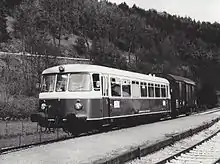
Into the 1980s, the Deutsche Bundesbahn ran GmP trains occasionally, but adding or detaching rolling stock created long wait times at stops, which contributed to their demise. They are no longer found in Germany, Austria or Switzerland.
PmG
The other variant in German-speaking countries was the PmG or "passenger train with goods service" (Personenzug mit Güterbeförderung). The Deutsche Reichsbahn in East Germany continued to operate some of these trains until the early 1990s. These comprised one or more goods wagons running behind the passenger coaches. Towards the end, no shunting took place at the intermediate stations. Some private railways once ran PmG trains.
Passenger trains transporting skiers, in places like Interlaken, still haul an open wagon for ski equipment.
New Zealand
Mixed trains were once prolific in New Zealand. Although express trains operated on the main lines, mixed trains served rural branch lines where dedicated passenger services would be uneconomical. On the more significant provincial routes, substituting a mixed train during the off-season was common in the late 19th century (the Rotorua Express), or operating the provincial express twice or thrice weekly while mixed services ran daily (the Taneatua Express).
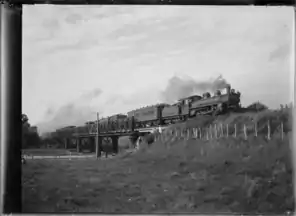
The shortcomings of mixed trains for passenger travel led the New Zealand Railways Department to investigate railcar technology in the early 20th century. Overseas designs could not be easily adapted to New Zealand owing to its rugged conditions, 3-foot-6-inch (1.07 m) narrow gauge track, and small loading gauge. Early railcars trials, such as the RM class Model T Ford railbuses, proved unsatisfactory. When successfully introduced from the 1930s, railcars primarily replaced unprofitable provincial carriage trains, and some mixed services in regions such as the West Coast and Taranaki.
Mixed trains dominated the South Island's more extensive branch-line network, but as private car ownership increased in the 1930s, passenger traffic decreased, closing many rural train routes. However, some mixed services lasted into the 1960s in isolated regions with poor roads. In the North Island, the last mixed trains operated into the 1970s, where services on the North Auckland Line ran until 1976.
An updated type of mixed train existed in the South Island for a few years during the 1990s, when a few wagons of express containerised freight were attached to the TranzCoastal Picton–Christchurch express. Unlike prior era mixed trains, with their slow en route shunting, this time-sensitive freight travelled swiftly.
North America
In North America, most branch lines, and sections of main lines, were worked by mixed trains. One or more passenger trains had served some routes, which switched to mixed trains as increased use of cars after the First World War depressed passenger traffic.[13] These were freight trains, that rarely had more than one passenger car, and sometimes ran with a combined passenger, mail and baggage car. Distinct from the typical slow version was the Prince Rupert fish/passenger express. The former slower types were sometimes called way freights, whose end coincided with numerous passenger services over several decades terminating in the 1970s. In the US, the Seaboard Coast Line Atlanta–Augusta mixed train operated until 1983.[14]
The last mixed train on the Canadian Pacific Railway was the Midland's Windsor–Truro, Nova Scotia mixed train, which operated until 1979.[15] By 1990, mixed trains existed on only four routes in Canada, namely the Via Rail (formerly Canadian National Railway) Wabowden–Churchill (ceased 2002)[16] and The Pas–Lynn Lake, the Ontario Northland Cochrane–Moosonee, and the Quebec North Shore and Labrador Sept Isles–Labrador City/Schefferville.[17]
Currently, the Keewatin Railway's The Pas–Pukatawagan leases passenger cars from Via Rail.[18][19] Tshiuetin Rail Transportation operates in northern Quebec.[20][21] These operations are the two surviving mixed trains in North America.
United Kingdom
The Birmingham and Gloucester Railway added passenger coaches to its daily goods in each direction from November 1841.[22][lower-alpha 1]
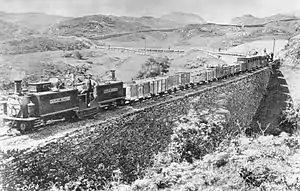
In 1864, the Ffestiniog Railway introduced mixed trains, with passenger coaches in the middle for the ascent.[23] Down trains were run in up to four separate (uncoupled) portions: loaded slate wagons, goods wagons, passenger carriages and the locomotive running light. This practice changed to a whole descending train, headed by the locomotive, for safety reasons.
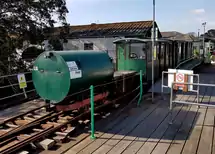
Opened in 1866, the Wrexham, Mold and Connah's Quay Railway operated mixed trains during its early years. On market days when space was at a premium, passengers sat on coal in the tender and crowded onto the footplate.[24] The Regulation Act of 1889 generally prohibited traditional mixed trains because the absence of continuous braking apparatus on wagons preceding the coaches jeopardized passenger safety. However, the Board of Trade exercised latitude in enforcing this rule, and some mixed trains ran until the end of the steam era.[25]
Goods wagons/vans requiring speedy delivery could be attached to the end of passenger trains. This included horse boxes, cattle wagons, parcels vans, newspaper vans, fish vans, milk tanks and churn vans.[26]
Possibly one of the last scheduled mixed services in the UK is the Hythe Pier, Railway and Ferry in Hampshire. This service is the oldest continually running pier train in the world (since 1922) and regularly carries diesel fuel to the pier head for the ferry.
References
- Other United Kingdom railways may have done this earlier as the source does not claim it as a first
- Ellis, Iain (2006). Ellis' British Railway Engineering Encyclopaedia. Lulu. p. 220. ISBN 978-1-84728-643-7.
- "New mixed train shuttle". www.railfreight.com.
- "New mixed train" (PDF). www.wagener-herbst.com.
- "The mixed train concept" (PDF). www.oliverwyman.com.
- "Mixed/composite train". www.irfca.com.
- "Mixed train definition". www.lexico.com.
- "Asmara–Ghinda mixed train". www.slrailwayfarrail.com.
- "Bulawayo–Harare mixed train". www.seat61.com.
- "Elazığ–Tatvan mixed train". www.egtre.info.
- "Fianarantsoa–Manakara mixed train". www.seat61.com.
- "Kandy–Badulla mixed train derailed". www.lonelyplanet.com.
- "Phnom Penh–Poipet mixed train". www.railtravelstation.com.
- Bader, Robert E. "The Curtailment of Railroad Service in Nebraska 1920–41" (PDF). www.nebraska.gov. pp. 34–36.
- "North American Railroads" (PDF). www.railwaystationlists.co.uk. p. 1.
- McDonnell, Greg (1991). "Last Train to Clarksville". Passing Trains: The Changing Face of Canadian Railroading. pp. 18–19.
- Via Rail , p. 45, at Google Books
- "Canadian Rail, March-April 1990" (PDF). www.exporail.org. p. 47.
- "Passenger cars - Café-Economy class car". VIA Rail. 1 April 2016. Retrieved 21 April 2018.
- "Resources & Links". National Association of Railroad Passengers. Archived from the original on 8 March 2012.
- "Tshiuetin Rail documentary". www.cbc.ca.
- "Evaluation of the Remote Passenger Rail Program". www.gc.ca.
- Long & Awdry (1987), p. 111.
- "A Railway is Born". www.festrail.co.uk.
- Great Britain's Railways, a New History , p. 134, at Google Books
- Great Britain's Railways, a New History , p. 193, at Google Books
- "Freight Operations - Non Passenger Coaching Stock". www.igg.org.uk.